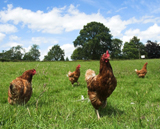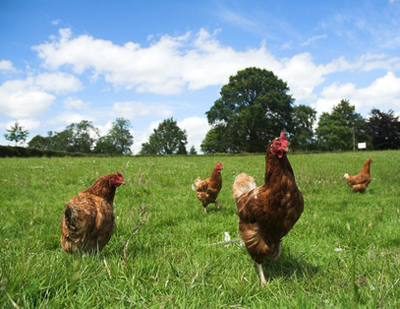Free range eggs still best
Buy high-end free range eggs, says experts, as the advantages of free-range husbandry are disputed by some


Free range hens have a far better quality of life than their caged cousins, campaigners have insisted. Last week, Prof Christine Nicol of the University of Bristol caused a stir by suggesting that not all free range- egg producers meet the welfare standards consumers expect, pointing to lower mortality rates and stress levels among the caged birds surveyed.

‘The problem is that the management of free-range systems in the UK at the moment is so variable,' she explains. ‘Although you get some brilliant farms, you also get some that are really, really not good.' Jane Howorth, founder of the British Hen Welfare Trust (www.bhwt.org.uk; 01884 860084)-which has re-homed nearly 400,000 hens since 2005-concurs: ‘Husbandry is of paramount importance, no matter what system hens are kept in,' she says. ‘It's all down to individual management. There is no doubt that well-run colony cage units [which house some 50% of British hens] offer improved welfare over the battery-cage system, which was banned in 2012.'
* Subscribe to Country Life and receive a bottle of single malt
‘However, free range gives birds greater freedom to express their natural behaviour,' adds Mrs Howorth, who advocates smaller flocks and traditional stockmanship. ‘Hens are inquisitive by nature-they like to go outside to rootle about, yet they want to feel safe and secure from predation, so they're more likely to venture out into open paddocks if farmers plant tree cover.'
Encouraging consumers to buy high end brands such as Happy Egg or Sainsbury's Woodland, Mrs Howorth adds: ‘Hens offer so much more with their feathers intact. They're such endearing, enchanting, intelligent and fun creatures. They give you a lovely, tasty breakfast or a delicious homebaked cake. They're also great stress busters-if you've had a tough day in the office, there's nothing better than hanging out with your hens. They're nowhere near as daft as people think they are.'
* Follow Country Life magazine on Twitter
Sign up for the Country Life Newsletter
Exquisite houses, the beauty of Nature, and how to get the most from your life, straight to your inbox.
An experienced journalist, Paula Lester, Country Life's Managing & Features Editor, has worked for the magazine for 10 years — during which time she’s overseen two special issues guest-edited by His Majesty The King in 2013 and in 2018, and the bestselling 2022 edition masterminded by his wife, Queen Camilla. A gamekeeper’s daughter, Paula began her career as a crime reporter on The Sidmouth Herald in Devon, before becoming Pony Club & Young Rider Editor, then Racing Editor, at Horse & Hound. Paula lives in Somerset with her two working Labradors, Nimrod and Rocky.
-
 Vertigo at Victoria Falls, a sunset surrounded by lions and swimming in the Nile: A journey from Cape Town to Cairo
Vertigo at Victoria Falls, a sunset surrounded by lions and swimming in the Nile: A journey from Cape Town to CairoWhy do we travel and who inspires us to do so? Chris Wallace went in search of answers on his own epic journey the length of Africa.
By Christopher Wallace
-
 A gorgeous Scottish cottage with contemporary interiors on the bonny banks of the River Tay
A gorgeous Scottish cottage with contemporary interiors on the bonny banks of the River TayCarnliath on the edge of Strathtay is a delightful family home set in sensational scenery.
By James Fisher